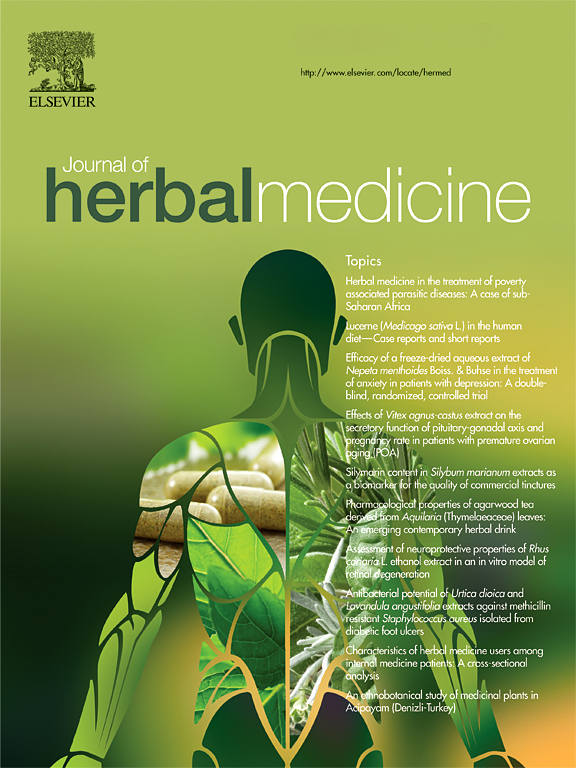芒果叶绿色合成纳米银及其对多重耐药菌的抗菌作用
IF 1.9
4区 医学
Q2 INTEGRATIVE & COMPLEMENTARY MEDICINE
引用次数: 0
摘要
耐多药细菌的增加对卫生保健提出了严峻的挑战,促使需要替代抗微生物策略。由于其生物活性特性,本研究探索了芒果叶与银纳米粒子(AgNPs)结合作为一种解决方案的潜力。植物化学筛选证实了关键生物活性化合物的存在,包括萜类、类固醇、酚类、黄酮类、单宁和生物分子,如magnifin和苯醌二叔丁基衍生物。利用水萃取物和乙醇萃取物合成了纳米银,并对耐甲氧西林的大肠杆菌、耐氧西林的克雷伯氏菌、耐甲氧西林的铜绿假单胞菌和耐甲氧西林的金黄色葡萄球菌进行了抗菌效果测试。乙醇提取物表现出优异的抑菌活性,对大肠杆菌的抑菌带为19.7 mm,对克雷伯氏菌的抑菌带为26.8 mm,对铜绿假单胞菌的抑菌带为22.9 mm,对金黄色葡萄球菌的抑菌带为24.1 mm,浓度为100 mg/ml。乙醇提取物也表现出较低的最低抑菌浓度和最低杀菌浓度值,表明与水提取物相比,乙醇提取物的效力更强。这些结果与先前的研究相一致,其中植物衍生的AgNPs,特别是来自乙醇提取物的AgNPs,由于生物活性化合物的溶解度更好而显示出更强的抗菌活性。总的来说,用AgNPs合成的籼稻提取物,特别是用乙醇合成的籼稻提取物,在对抗多药耐药细菌方面具有巨大的潜力,并为传统抗生素提供了一种环保的替代品。建议进一步研究其临床应用。本文章由计算机程序翻译,如有差异,请以英文原文为准。
Green Synthesis of Silver Nanoparticles Using Mangifera indica Leaves and Their Antibacterial Efficacy Against Multidrug-Resistant Bacteria
The rise of multidrug-resistant bacteria presents a critical challenge to healthcare, prompting the need for alternative antimicrobial strategies. This study explores the potential of Mangifera indica (mango leaves) combined with silver nanoparticles (AgNPs) as a solution due to their bioactive properties. Phytochemical screening confirmed the presence of key bioactive compounds, including terpenoids, steroids, phenols, flavonoids, tannins, and biomolecules such as magniferin and benzoquinone di-tert-butyl derivative. Silver nanoparticles were synthesised using both aqueous and ethanolic extracts, with the antibacterial efficacy tested against methicillin-resistant Escherichia coli, oxacillin-resistant Klebsiella spp, methicillin-resistant Pseudomonas aeruginosa, and methicillin-resistant Staphylococcus aureus. The ethanolic extract demonstrated superior antibacterial activity, with inhibition zones of 19.7 mm against E coli, 26.8 mm against Klebsiella spp, 22.9 mm against P aeruginosa, and 24.1 mm against S aureus at 100 mg/ml. The ethanolic extract also exhibited lower minimum inhibitory concentration and minimum bactericidal concentration values, indicating greater potency compared to the aqueous extract. These results align with previous research, where plant-derived AgNPs, particularly from ethanolic extracts, have shown stronger antimicrobial activity due to better solubility of bioactive compounds. Overall, M indica extracts synthesised with AgNPs, especially using ethanol, offer significant potential in combating multidrug-resistant bacteria and provide an eco-friendly alternative to traditional antibiotics. Further research into clinical applications is recommended.
求助全文
通过发布文献求助,成功后即可免费获取论文全文。
去求助
来源期刊

Journal of Herbal Medicine
INTEGRATIVE & COMPLEMENTARY MEDICINE-
CiteScore
3.90
自引率
0.00%
发文量
94
期刊介绍:
The Journal of Herbal Medicine, the official journal of the National Institute of Medical Herbalists, is a peer reviewed journal which aims to serve its readers as an authoritative resource on the profession and practice of herbal medicine. The content areas of the journal reflect the interests of Medical Herbalists and other health professionals interested in the clinical and professional application of botanical medicines. The objective is to strengthen the research and educational base of herbal medicine with research papers in the form of case studies, original research articles and reviews, monographs, clinical trials and relevant in vitro studies. It also publishes policy statements, opinion pieces, book reviews, conference proceedings and profession related information such as pharmacovigilance reports providing an information source for not only the Herbal Practitioner but any Health professional with an interest in phytotherapy.
 求助内容:
求助内容: 应助结果提醒方式:
应助结果提醒方式:


